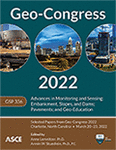Probabilistic Assessment of Stability of Sloped Pavement Shoulders Subjected to Super Heavy Load (SHL) Vehicles
Publication: Geo-Congress 2022
ABSTRACT
Super Heavy Load (SHL) vehicles typically carry heavy loads that exceed the permissible truck weight/size limits set forth by state highway agencies. Operation of wide SHL trailers with heavy wheel loads and non-conventional axle arrangements can potentially jeopardize the stability of pavement shoulders. This study presents a methodology for assessment of the stability of sloped pavement shoulders under SHL vehicle operations. The proposed approach extends the conventional Limit Equilibrium Method (LEM) to a probabilistic methodology that accounts for the uncertainties associated with shear strength properties of pavement unbound layers. Another major point of departure of the proposed methodology from the traditional LEM pertains to its capability for handling the demanding loading conditions imposed by SHL vehicles. To accomplish the research objective, initially, the authors devised a plan of field testing to collect relevant information on traffic loading conditions, pavement layer properties, and shoulder characteristics in ten representative sites in overload corridors in Texas. Subsequently, this information was incorporated into a 3D finite-element system to calculate the horizontal driving forces applied to the pavement shoulder due to SHL vehicle movement. A Monte Carlo Simulation (MCS) was then used to randomly generate the shear strength parameters of the base and subgrade layers. Ultimately, the resisting shear forces were compared with the sliding forces along the trial slip surfaces to determine the probability of failure for the sloped shoulders, with consideration of the SHL-induced surcharge loads, weight of the sliding block, and lateral earth pressure from the adjacent soil. The results underscored the significance of the wheel load and shoulder slope in stability analysis procedure, as operation of SHL vehicles with higher load magnitude on tires resulted in a substantial increase in the probability of failure for pavement shoulders with steep side slopes. The proposed approach can provide means to assess the potential risk against failure of sloped shoulders subjected to SHL vehicles, considering the non-conventional axle assembly of SHLs, and unique characteristics of pavement shoulders in the network.
Get full access to this article
View all available purchase options and get full access to this chapter.
REFERENCES
Ashtiani, R. S., Morovatdar, A., Licon, C., Tirado, C., Gonzales, J., and Rocha, S. (2019). “Characterization and quantification of traffic load spectra in Texas overweight corridors and energy sector zones.”, Texas. Dept. of Transportation.
Chatti, K., Manik, A., Salama, H., Haider, S. W., Brake, N., Mohtar, C. E., and Lee, H. S. (2009). “Effect of Michigan multi-axle trucks on pavement distress.”, Michigan Department of Transportation, Lansing, Michigan, USA.
Chen, X., Lambert, J. R., Tsai, C., and Zhang, Z. (2013). “Evaluation of superheavy load movement on flexible pavements.” International Journal of Pavement Engineering, 14(5).
Cho, S. E. (2010). “Probabilistic assessment of slope stability that considers the spatial variability of soil properties.” Journal of geotechnical and geoenvironmental engineering, ASCE, 136(7).
Dong, Q., and Huang, B. (2013). “Field Measurement of Pavement Responses under Super Heavy Load.” In International Journal of Pavements Conference, São Paulo, Brazil.
Fernando, E. G. (1997). “Guidelines for evaluating superheavy load routes”.
Griffiths, D. V., and Fenton, G. A. (2004). “Probabilistic slope stability analysis by finite elements.” Journal of geotechnical and geoenvironmental engineering, ASCE, 130(5), 507.
Hajj, E. Y., Siddharthan, R. V., Nabizadeh, H., Elfass, S., Nimeri, M., Kazemi, S. F., and Piratheepan, M. (2018). “Analysis procedures for evaluating superheavy load movement on flexible pavements.”, FHWA, Washington, DC.
Liu, G., Zhuang, X., and Cui, Z. (2017). “Three-dimensional slope stability analysis using independent cover based numerical manifold and vector method.” Engineering Geology, 225.
Ma, Z., Liao, H., Dang, F., and Cheng, Y. (2021). “Seismic slope stability and failure process analysis using explicit finite element method.” Bulletin of Engineering Geology and the Environment, 80(2), 1287–1301.
Morovatdar, A., and Ashtiani, R. S. (2021a). “Influence of traffic characterization methodology on service life prediction of pavements subjected to overweight traffic operations.” In Civil Infrastructures Confronting Severe Weathers and Climate Changes Conference, Springer.
Morovatdar, A., and Ashtiani, R. S. (2021b). “Influence of slow-moving nature of super heavy load (SHL) vehicles on the service life of pavement structures”. In International Airfield and Highway Pavements Conference 2021, ASCE, https://doi.org/10.1061/9780784483503.015.
Morovatdar, A., Ashtiani, R. S., Licon, C., Tirado, C., and Mahmoud, E. (2020a). “Novel framework for the quantification of pavement damages in the overload corridors.” Transportation Research Record (TRR), https://doi.org/10.1177/0361198120925807.
Morovatdar, A., Ashtiani, R. S., and Licon, C., Jr. (2020b). “Development of a mechanistic framework to predict pavement service life using axle load spectra from Texas overload corridors.” In International Conference on Transportation and Development 2020, ASCE.
Oh, J. H., Chen, D. H., Walubita, L. F., and Wimsatt, A. J. (2011). “Mitigating seal coat damage due to superheavy load moves in Texas low volume roads.” Construction and Building Materials, 25(8), 3236–3244.
Su, Z., and Shao, L. (2021). “A three-dimensional slope stability analysis method based on finite element method stress analysis.” Engineering Geology, 280, 105910.
Thach, N. N., Morovatdar, A., Ashtiani, R. S., and Kosheleva, O. (2021). “Impact of super heavy load vehicles on transportation infrastructure: economic aspects.” Soft Computing, 25(12), 8003–8006. https://doi.org/10.1007/s00500-021-05821-2.
Zeng, P., Jimenez, R., and Li, T. (2016). “An efficient quasi-Newton approximation-based SORM to estimate the reliability of geotechnical problems.” Computers and Geotechnics, 76, 33–42.
Zhang, J., Wang, H., Huang, H. W., and Chen, L. H. (2017). “System reliability analysis of soil slopes stabilized with piles.” Engineering Geology, 229, 45–52.
Information & Authors
Information
Published In
History
Published online: Mar 17, 2022
Authors
Metrics & Citations
Metrics
Citations
Download citation
If you have the appropriate software installed, you can download article citation data to the citation manager of your choice. Simply select your manager software from the list below and click Download.
